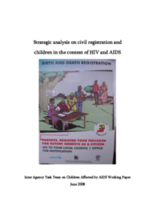Civil registration is of utmost importance for both states and individuals affected by HIV and AIDS. In the context of HIV and AIDS, civil registration systems allow states to monitor their population, enabling effective policies to be formulated and implemented, protecting and fulfilling the rights of people living with HIV and communities affected by the pandemic. Simultaneously, civil registration acts as a source of protection for individuals, as such systems provide legal documentation establishing an individual’s identity, nationality, and kinship, which are necessary proof for securing property rights, and accessing basic services such as health care and education. While civil registration establishes and provides documentation of births, foetal deaths, marriages, divorce and deaths, in the context of HIV and AIDS, birth and death registration are of particular importance in understanding the impact of the pandemic on children’s rights. That said, only reliable statistics and information on birth registration are available. The report hence focuses on the extent to which the HIV pandemic influences accessibility and availability of birth registration systems in Africa, and how Africa’s weak birth registration systems impact on the large number of children affected by AIDS. Birth registration is enshrined in the Convention on the Rights of the Child and the African Charter on the Rights and Welfare of the Child, as well as other international legal instruments, as a fundamental right for all children, and it places the obligation on states to ensure this right.
The report focuses on all 45 countries in Eastern, Southern, Western and Central Africa, which have the highest number of people living with HIV and the highest number of children orphaned by AIDS in the world. Eastern and Southern Africa has the lowest birth registration rates in the world, and Western and Central has the third lowest rates. The report analyses birth registration rates in accordance with HIV prevalence rates, and a desktop review and responses to a questionnaire designed by the consultants to gather practical information, challenge the assumption that high HIV prevalence rates correspond to the low birth registration rates in sub-Saharan Africa. There is no empirical evidence proving HIV prevalence rates to be a pertinent detrimental factor to the availability of birth registration systems. Instead, the report demonstrates that demographics and socio-economic factors, and particularly poverty, do not fail to play key roles in the availability of such systems. Political will and understanding of birth registration as a fundamental human right are also identified to be a key barrier to the availability of effective and sustainable birth registration systems.

